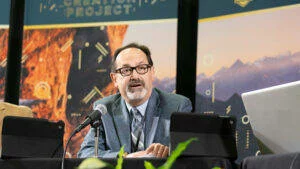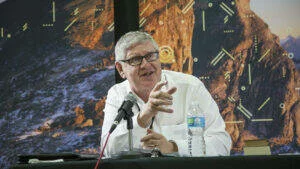 Let me focus on your main questions, which I have numbered for ease of reference:
Let me focus on your main questions, which I have numbered for ease of reference:
- Is it true that motives are completely irrelevant?
- Why do scientists so strongly disagree on the central claims of the ID movement?
- How do you define the scientific theory of ID?
We’ll start with (1), then turn to (2) and (3).
Motivations in Context
- Is it true that motivations are completely irrelevant?
Who possesses motives?
Humans do. Theories do not, nor do concepts or ideas, nor do propositions.
That is the problem with focusing on motives in the ID vs. naturalistic evolution debate. Any contest between these two views should be centered on their propositional content, namely, on what they say about the natural world. But if someone asks me about Johannes Kepler’s motives, or Charles Darwin’s motives, or Mike Behe’s, he is asking about the desires, purposes, or goals of particular human beings—Motives are not “completely irrelevant,” of course, if we are trying to understand someone’s psychology or why he might be willfully blind to certain kinds of evidence. But motives are irrelevant to determining the truth of an idea.all of which may be interesting, even fascinating in their own right, but none of which bears in the least on the truth or falsehood of what Kepler, Darwin, Behe, or anyone else, for that matter, said about the natural world.
And that is why—unlike a criminal investigation, where searching for the motive of someone’s actions makes sense—to determine truth in science or philosophy, motives are irrelevant. Logic textbooks often feature a section headed “Fallacies of reasoning.” Notable among these errors is the genetic fallacy, so named because the fallacy focuses on the causal genesis (i.e., the origin, or motivation) of someone’s statements, but not on the statements’ truth or falsehood. Mr. Smith said what he did—that proposition P, let’s say, was true—only because he wanted to impress his girlfriend. Ms. Jones claimed that concept Q was false, because she had long been troubled about pervasive sexism at her university. Smith and Jones have motives, it seems. What a surprise.
All right: those motives represent facts about the personalities, or individual histories, of Mr. Smith and Ms. Jones. Now, however, to the real business at hand: Is proposition P true? Is concept Q false?
No amount of inspecting of anyone’s motives can tell us that. The genesis or causal history of what Mr. Smith said, for instance, or his motivations, cannot make proposition P true, if it is not. For that, we must forget about Smith, turn to the evidence, and examine proposition P itself. All the best motives in the universe cannot enable us to factor prime numbers into anything other than 1, and the prime itself, or render perpetual motion machines possible—nor can the very worst motives change the speed of light, or the diploid chromosome number of chimpanzees.
Motives are not “completely irrelevant,” of course, if we are trying to understand someone’s psychology or why he might be willfully blind to certain kinds of evidence. But motives are irrelevant to determining the truth of an idea. The genetic fallacy turns one’s attention away from the evidence, and the all-important question of truth and falsehood, towards other people, their idiosyncrasies, social and cultural contexts, and personal histories—none of which can be trusted to tell us what is true or false about ideas such as intelligent design or evolution. And truth or falsehood is what we most need to know.
Every Mind an Agent
Which brings me to the next question:
- Why do scientists so strongly disagree on the central claims of the ID movement?
A crowd of arguments have been offered for rejecting ID. After nearly 40 years within the ID community, however, I now see one of these arguments as the most significant, and therefore the greatest obstacle to ID’s acceptance within mainstream science. ID requires that the causal power of “agency,” “intelligence,” or “mind,” be a foundational (meaning original and irreducible) constituent of reality.
Now, for any scientist who is philosophically committed to a physicalist or materialist conception of empirical reality, this ID premise will be wholly unacceptable. Science, it is widely claimed—and this is the chief argument contra ID—must be founded on the complete causal closure of the universe,ID requires that the causal power of “agency,” “intelligence,” or “mind,” be a foundational (meaning original and irreducible) constituent of reality. i.e., on the ontological primacy and hence explanatory sufficiency of non-intentional, undirected entities and causes. “Mind” thus becomes a secondary, or derivative, aspect of reality. Not surprisingly, many critics of ID, such as evolutionary geneticist Jerry Coyne, or theoretical physicist Sean Carroll, deny the existence of human agency, where free choices are made and authentic creativity exercised.
Physics runs the universe, they say, because there is nothing else; and we humans— via the long road of undirected evolution—are its offspring. Yes, we may reflect and write articles such as this one, choose deliberately from restaurant menus, or muse on the sofa, with the cable remote in hand, about which late-night comedian to watch, but, at bottom, these apparent decisions are all, and only, physics. Creative agency (that is, the similitude of such) appears only very late in the history of the universe, at the end of a multi-billion-year evolutionary pathway.
ID says no to that seductive but erroneous picture of reality. ID says that real causes exist in the universe (meaning the whole of reality) that do not derive, and cannot be derived, from its bottom-most ontological layer—i.e., they are genuinely irreducible. With the help of some philosophy, ID theorists argue that these causes are individually sui generis and thus have identifying personal names: “God” as the ultimate Mind, the source of all being, but also the finite and lesser minds of Plato, Augustine of Hippo, Albrecht Dürer, Johann Sebastian Bach, Mary Cassatt, Edward Hopper, Louis Armstrong, Francis Crick—and you. Every mind is unique.
Most importantly for science, these agencies leave detectable effects, such that when the histories of those effects are analyzed, they diagnostically indicate their original sources, to the exclusion of other possible causal entities (e.g., physical forces or particles). These agencies are endowed with powers to bring into existence, de novo, patterns and objects bearing novel information and complex functions. Finally, because these agencies are genuinely irreducible, eliminating them from the furniture of reality entails that one can never get them back—that is, construct them— from anything else in the universe.
Definitions, Flippant and Formal
To the last question, then:
- How do you define the scientific theory of ID?
My working definition of ID fits on a bumper sticker: If reality = physics, you wouldn’t be reading this right now. Intelligence is real and explains stuff. Okay, now do your science.
All right, that sounds flippant, I admit—but it isn’t, because the implications of taking “intelligence” or “mind” seriously as an irreducible reality in nature are radical and far-reaching. If the causal power of “intelligence” or “mind” or “agency”—whatever name we assign to this reality is our own convention—constitutes a truly foundational dimension of the universe, then a great many things about the world and its objects may be the case, scientifically speaking, which would not be possible, or even conceivable, under the opposing viewpoint of physicalism or naturalism. For those who like their definitions served up formally, on a silver tray with white gloves, use this:
Intelligence is a fundamental constituent of all reality and as a cause leaves effects that natural science can detect. Science must therefore be free to employ design as an explanation, where the evidence may indicate, because the pursuit of understanding requires no less.
So what are the implications of this for science? Staying for the moment just with biology, here are two consequences about which I think a lot:
- The living state may represent a profound discontinuity in nature, unreachable “bottom-up” from its material parts, whose existence indicates unmistakably the necessity of “top-down,” or mind-first, system-primary causation. For biology, in the beginning was the organism, caused by mind. This proposition is fully consonant with everything we actually know about organisms, and thus scientifically trustworthy. It is not consonant with physicalism or materialism, to be sure, but that’s no real loss.
- The apparently discontinuous appearance in Earth history of novel forms of animals and plants may be more than an appearance, but a genuine signal, indicating the action of mind in space and time. If so, any historical part of biology—e.g., paleontology, comparative genetics, evolutionary theory—must weigh its data in the light of the possibility of intelligent causation. Failure to find an adequate evolutionary mechanism for some event (say, the origin of the animal phyla) may represent evidence, not the incompleteness of a physicalist approach to such questions. This evidence would only be partial, and a step towards a fuller ID account, but would be significant nonetheless.
The “science” of ID stems directly from its open-ended metaphysics of causality and explanation. Are mind, agency, and intelligence real, irreducible to any other object or cause in the universe?
Answer that question in the affirmative, and (whether one knows it or not) one has taken the first, and most important, step in the direction of ID. Science, if it is a truth-seeking enterprise, has nothing to fear from ID, and much to gain. The fact that natural science arose in an era (the Scientific Revolution of the seventeenth and eighteenth centuries) where design was seen as fully rational, should be more than enough to reassure us that free inquiry into questions of cosmology, historical biology, consciousness, and the origin of humanity, will benefit from a richer array of possible causes than the impoverished tin box of naturalism. It is past time to return to the explanatory toolkit that Linnaeus, Cuvier, Newton and Boyle knew, and in which Darwin himself was educated before he set sail on the Beagle in 1831.







Comments
Be the first one to make a comment!